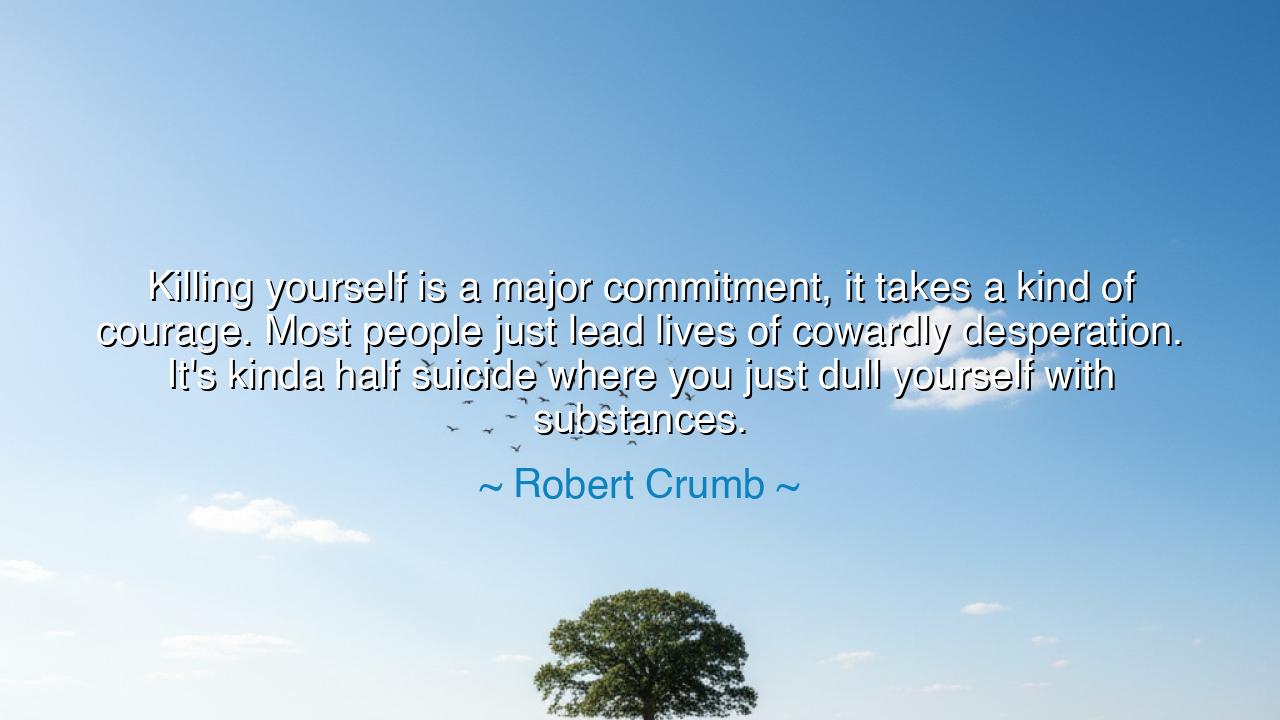
Killing yourself is a major commitment, it takes a kind of
Killing yourself is a major commitment, it takes a kind of courage. Most people just lead lives of cowardly desperation. It's kinda half suicide where you just dull yourself with substances.






“Killing yourself is a major commitment, it takes a kind of courage. Most people just lead lives of cowardly desperation. It's kinda half suicide where you just dull yourself with substances.” — Thus spoke Robert Crumb, the artist and social critic whose sharp pen and unflinching honesty peeled back the skin of modern existence to expose the raw nerves beneath. His words, though dark and unsettling, contain a strange and piercing truth — that many who live do not truly live, and that the deeper tragedy of our time is not death, but the slow, silent dying of the spirit. Crumb’s reflection is not a glorification of despair, but a lament for a world that flees from its own pain — a world that numbs, distracts, and forgets instead of confronting the vast and often frightening depths of what it means to be human.
The origin of this quote lies in Crumb’s lifelong rebellion against falseness — against the mechanized, empty patterns of modern life. He watched as people, crushed beneath the weight of conformity and consumerism, sought refuge in the dulling comforts of alcohol, drugs, and routine. He saw that true courage does not lie in the mere act of surviving, but in facing the rawness of existence without illusion. When he speaks of “cowardly desperation,” he is describing a spiritual paralysis — the condition of those who continue to breathe, yet have silenced their souls, who move through their days anesthetized to both their suffering and their wonder.
To kill oneself, he says, is a “major commitment” — not because it is noble, but because it requires confronting death directly, without disguise. Yet most, he observes, choose a subtler form of death: a half suicide, in which the individual extinguishes the fire of feeling slowly through endless distraction. In this way, Crumb’s words echo the ancient warning of Socrates, who said, “The unexamined life is not worth living.” For the life that avoids truth, that flees from its own despair rather than seeking meaning within it, becomes a hollow shell — a motion without spirit, a survival without purpose.
This idea finds a haunting reflection in the story of Vincent van Gogh, a man whose passion for truth consumed him. Van Gogh’s life was marked by suffering — loneliness, rejection, and mental torment — yet even in his agony, he refused to dull his senses or numb his heart. He felt everything: the burning of color, the ache of love, the terror of isolation. He painted not to escape, but to confront. His art was his courage — his way of standing naked before life’s beauty and cruelty. And though his despair eventually led him to end his life, his legacy stands as a testament to what Crumb means: that to live fully — even in pain — is rarer and braver than the passive comfort of self-forgetting.
Crumb’s lament speaks also to our modern age, where the soul’s hunger is met with distraction rather than depth. We scroll, consume, and intoxicate ourselves with constant noise, fearing silence because it forces us to face what lies within. The half-suicide of our time is not the dramatic act of ending one’s life, but the quiet surrender of consciousness — the decision to stop feeling deeply, thinking deeply, or hoping deeply. It is a slow drowning in pleasure and convenience, where comfort replaces meaning and survival masquerades as fulfillment.
Yet, within his grim observation lies an urgent call to awakening. Crumb’s challenge is not to die, but to wake up — to reclaim the courage to feel, to think, to suffer, and still to create. To face life honestly, without self-deception, is itself an act of defiance. True courage, he suggests, is not in the act of dying, but in the act of living with eyes wide open — seeing the emptiness, the injustice, the absurdity of the world, and still choosing to engage with it authentically. To live bravely is to reject the half-death of numbness, to embrace even pain as proof that the heart still beats.
So, my listener of the future, take this lesson as a mirror for your own life: Do not dull your soul. Do not mistake comfort for peace or distraction for joy. When despair comes, do not run from it — face it, understand it, and let it teach you the value of feeling. Create, love, speak, and live as one who knows that to be alive is to stand upon a fragile edge between light and shadow. The world will offer you many anesthetics — substances, screens, false certainties — but choose instead the raw truth of consciousness.
For in the end, as Crumb’s bitter wisdom reminds us, the greatest act of courage is not to end one’s life, but to live it — fully, vulnerably, fiercely — without surrendering to the slow death of indifference. Let your pain sharpen your vision, your joy deepen your heart, and your truth remain unmuted. For to feel, to create, to endure — that is what it truly means to live.






AAdministratorAdministrator
Welcome, honored guests. Please leave a comment, we will respond soon